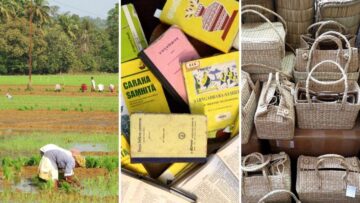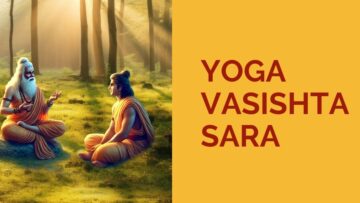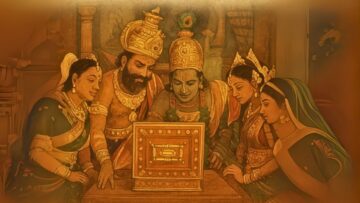Background
During the present wave of IKS Studies, one of the areas that has been receiving good attention has been the area of government administration, philosophy of the state and political power and the ideas and ideals of governance.
IKS vs Contemporary Categories
Like in any area of IKS studies, the divisions of areas of study in the premodern Indian knowledge systems need not exactly match with the divisions of areas of contemporary knowledge systems. We may have to draw ideas relevant to a certain contemporary knowledge system from the textual and other sources of multiple different areas of study in the traditional Indian knowledge Systems. For example, while Political Science and Public Administration are contemporary academic disciplines, we do not have the exact same fields or their textual and other sources in the premodern Indian Knowledge Systems.
Emerging Academic Disciplines
In the contemporary academics, gradually, the conventional disciplinary divisions like Political Science are leaving way to new interdisciplinary and multidisciplinary areas of study like Governance Studies, Statecraft Studies, Leadership Studies etc.
Recent Developments
When looked at from the perspective of such first principles approach, textual and other sources of traditional Indian knowledge systems are getting recognized to be providing rich resources for new ways of thinking in these areas.
Books are getting published, courses are getting designed and taught, talks are being organized in this direction.
Overemphasis on Certain Texts
But what is being noticed is that only a few texts like Kautilya’s Artha Shastra and that too only some specific sections or understandings of it are getting repeated attention in this process and many other textual sources, and the other sections and aspects of the texts that are currently being used that have a great scope for being used for this purpose are not getting due attention.
Goal of this Symposium
INDICA is organizing a symposium for furthering the exploration towards new textual sources and new aspects in the known sources for the IKS studies in these newly emerging contemporary areas of Governance Studies, Statecraft Studies, Leadership Studies etc covering the following texts:
Panchatantra & Hitopadesha
Fortunately, Panchatantra which was earlier viewed as just a book of moral tales or fables or book teaching ways of the world, is now getting a correct understanding of being an amazing and globally unique pedagogical tool for teaching statecraft through tales. But a detailed study of this book, for example, how each of the five divisions of the book teach five different key aspects of statecraft has not been brought out so far.
Hitopadesha is another text modelled after Panchatantra that did not receive attention from this perspective.
Itihasa–Puranas
Portions of Itihasa -Purana texts like Vidura Neeti of Mahabharata received good attention. But many other Rajadharma sections of Mahabharata itself or the Rajadharma/Rajaneeti sections of Ramayana and numerous Mahapuranas and Upapuranas have not been paid a similar degree of attention.
Though how the narrative portions of all these Itihasa Purana texts have illustrations, suggestions and messages of statecraft, governance, leadership etc., have been touched upon to some extent, there is a lot more scope for work than what is done in this area. Apart from the original Sanskrit versions of these texts, the regional Indian language translations and transcreations of these texts too offer rich resources in this area.
Kavya Literature
Kavya literature, mostly based on or modelled after the Itihasa-Purana literature, in all the Indian languages including Sanskrit, is another area so far not explored from this perspective. Kavyas and kavya like poetic and prose works providing the legendary biographies of kings are also so far unexplored rich sources of knowledge in this area. Palanati Veerracharitramu a Telugu kavya by the legendary poet Srinathudu is viewed as a ballad on a legendary battle. This is called as Palanati Bharatamu for its similarity to Mahabharata; this is an example for such ballad like works being rich resources in this area.
Historical Accounts
Rayavachakamu a firsthand account in the rural Telugu dialect, of Sri Krishna Deva Raya’s life, by a security official of the fort is a historical source helpful as a rich resource in this area. Many similar historical sources in the other Indian languages, dealing with the lives of kings can be explored for this purpose. Inscriptions by kings including Ashoka’s Edicts, many inscriptions from the Tamil , Telugu and other language regions of the Indic subcontinent document the governance perspectives of different Indian kings.
Niti Literature and Subhashitas
Among the books and compilations of what are usually known as Niti books, Nitishatakams, Sukti and Subhashita compilations that include Bhartrihari’s Nitishatakam in Sanskrit, Tirukkural in Tamil, a very big number of Niti Shatakams in Telugu including a 14th century compilation of Niti works called Sakalanitisammatamu which are usually rightly understood as books of morals or books instructing ways of the world for the people at large, there are portions that are specifically addressed to kings and other political leadership and contain highly useful gems of knowledge in the areas of statecraft, governance and leadership. In the Telugu book Rayavachakamu mentioned above, there is a description of king Krishna Deva Raya having a daily routine of listening to a reciting professional’s recitations of such Subhashita verses focusing on statecraft and governance, one per day.
Other Texts
Kamandaka Niti Sara or Shukra Niti texts known to be in the lineage of texts like Artha Shastra have not been paid enough separate attention.
There can be more such so far unexplored sources and, so far unexplored portions and aspects of the explored sources in this area.
Invitation to Scholars
INDICA invites scholars to present their talks in this online symposium on the 28th September 2025. Scholars interested in giving talks may send the title of their talk with a brief abstract to namaste@indica.org.in. Suggestions of suitable scholars with their contact information may also be sent to namaste@indica.org.in.






